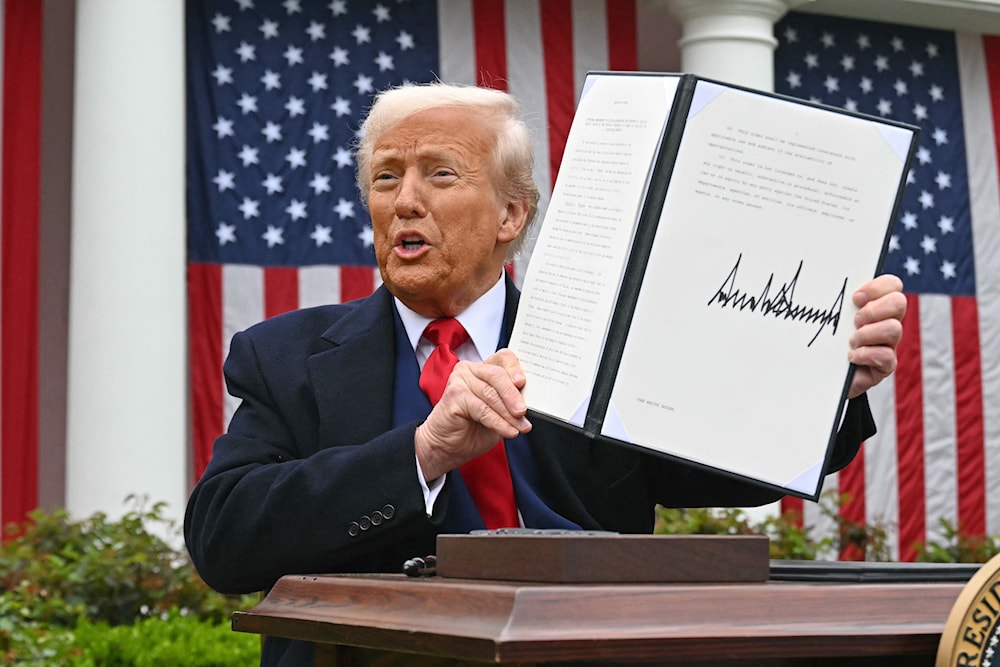On 'Liberation Day', Trump announces 'reciprocal tariffs' worldwide
US President Donald Trump signs an executive order on broad tariffs on global imports, calling it "Liberation Day" for US industry.
-
 US President Donald Trump holds a signed executive order after delivering remarks on reciprocal tariffs during an event in the Rose Garden entitled "Make America Wealthy Again" at the White House in Washington, DC, on April 2, 2025. (AFP)
US President Donald Trump holds a signed executive order after delivering remarks on reciprocal tariffs during an event in the Rose Garden entitled "Make America Wealthy Again" at the White House in Washington, DC, on April 2, 2025. (AFP)
US President Donald Trump on Wednesday introduced sweeping tariffs, branding the move as "Liberation Day" in a bid to protect American industry, a decision that risks triggering a global trade war.
Speaking from the White House Rose Garden, flanked by US flags, Trump considered that the United States had been "looted, pillaged, raped and plundered by nations near and far, both friend and foe alike."
The dollar fell 1% against the euro and slipped against other major currencies as Trump was speaking.
While he did not immediately outline the full scope of the tariffs, the 78-year-old Republican stated that he was signing an executive order to impose "reciprocal tariffs on countries throughout the world" based on how they treat the US.
"This is Liberation Day. April 2nd, 2025 will forever be remembered as the day American industry was reborn, the day America's destiny was reclaimed, and the day that we began to make America wealthy again," US President Donald #Trump declared moments before he announced tariffs… pic.twitter.com/dau4mO9Wxe
— Al Mayadeen English (@MayadeenEnglish) April 2, 2025
'Liberation Day'
"This is Liberation Day," Trump proclaimed, adding that it would "forever be remembered as the day American industry was reborn, the day America's destiny was reclaimed."
His speech was met with enthusiastic cheers from cabinet members and workers in hard hats representing industries such as steel, oil, and gas, as he vowed that the tariffs would "make America wealthy again."
Trump had been signaling the move for weeks, asserting that tariffs would prevent the US from being "ripped off" and usher in a new "Golden Age" of American industry. However, many economists warn that the tariffs could push the US into recession as costs trickle down to consumers while also escalating global trade tensions.
The world had been anxiously awaiting Trump’s announcement, with markets fluctuating in anticipation of the extent of the tariffs. Countries feared heavy penalties, and trading partners were bracing for retaliation.
Tariffs everwhere
Trump directed some of the steepest tariffs at what he described as "nations that treat us badly," imposing 34% on imports from geopolitical rival China, 20% on key ally the European Union, and 24% on Japan.
But the US president – who held up a chart with a list of levies – said that he was "very kind" and so was only imposing half the amount that those countries taxed US exports.
For the rest, Trump said he would impose a "minimum baseline" 10% tariff on trading partners, including Britain and Ukraine.
Countries like Lesotho and Cambodia are hit with some of the highest tariffs, at 50% and 49%, respectively, while some of the most notable tariffs include Laos at 48%, Madagascar at 47%, Vietnam at 46%, and Sri Lanka at 44%.
Trump's new tariffs on US trading partners are set to take effect this weekend, White House officials announced, with higher rates on the "worst offenders" scheduled to follow next week.
Citing a "national emergency" driven by security concerns over persistent trade deficits, the White House told reporters that a "baseline" 10% tariff will be implemented at 12:01 am (0401 GMT) on April 5, while increased rates on specific partners will take effect at 12:01 am on April 9.
Trump shuts down 'de minimis' trade loophole, trade war imminent
Additionally, Trump signed an executive order that closes a trade loophole used to ship low-value packages duty-free from China, known as "de minimis," Reuters reported, citing an aide.
The European Union pledged to respond "before the end of April," initially targeting US actions on steel and aluminum before expanding countermeasures sector by sector.
British Prime Minister Keir Starmer, who has sought but failed to secure an exemption from the tariffs, warned that a "trade war is in nobody’s interest," vowing that his government was prepared for "all eventualities." Meanwhile, Germany cautioned that trade conflicts harm "both sides."
Trump kept details under wraps until the last moment, with the White House saying he was still "perfecting" the tariffs just hours before the announcement. Meanwhile, a 25% tariff on auto imports, announced last week, is set to take effect at 12:01 am (0401 GMT) on Thursday.
While Trump remains steadfast in his belief that tariffs are the solution to America's trade imbalances and economic struggles, critics argue that US businesses and consumers will bear the cost.
European Central Bank President Christine Lagarde warned that, regardless of other nations’ responses, the impact "will be negative anyway the world over."
Trump has previously backed down on tariffs targeting Canada and Mexico amid trade negotiations, though he had initially imposed levies on them, citing their failure to curb the flow of the deadly opioid fentanyl into the US.
The US president has previously implemented 20% tariffs on all imports from China, along with 25% tariffs on steel and aluminum, which have now been expanded to cover nearly $150 billion worth of related downstream products.
Read more: 'Israel' drops tariffs on US ahead of Trump's duties on trade allies

 5 Min Read
5 Min Read








